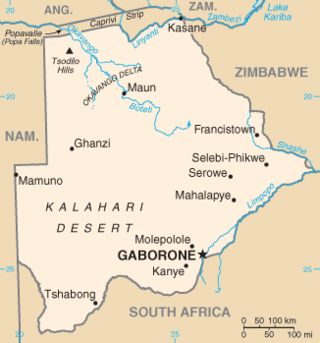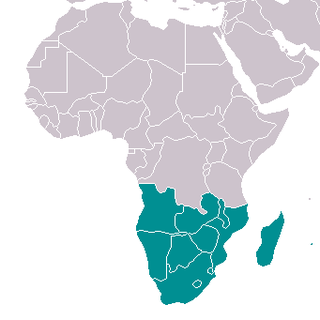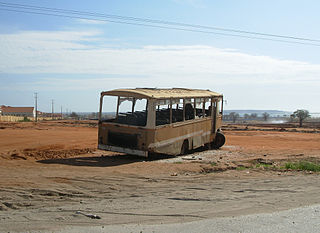
The Internal Settlement was an agreement which was signed on 3 March 1978 between Prime Minister of Rhodesia Ian Smith and the moderate African nationalist leaders comprising Bishop Abel Muzorewa, Ndabaningi Sithole and Senator Chief Jeremiah Chirau. After almost 15 years of the Rhodesian Bush War, and under pressure from the sanctions placed on Rhodesia by the international community, and political pressure from South Africa, the United Kingdom, and the United States, the Rhodesian government met with some of the internally based moderate African nationalist leaders in order to reach an agreement on the political future for the country.
The following lists events that happened during 1973 in Rhodesia.
United Nations Security Council Resolution 216 was adopted by the United Nations Security Council on 12 November 1965, the day after the British Dependency of Southern Rhodesia's Unilateral Declaration of Independence from the British Empire as the state of Rhodesia. The vote was ten to none, with one member, France, abstaining.
United Nations Security Council Resolution 202, adopted on May 6, 1965, after reaffirming motions from the General Assembly, the Council requested that no member state accept a Unilateral Declaration of Independence from Southern Rhodesia and that the United Kingdom take all measures necessary to prevent it. The resolution also called on all political prisoners to be released and for the freedom of political parties to operate. The Council requested that the UK work toward and equitable constitution and for the future independence of a majority-ruled Southern Rhodesia.
United Nations Security Council Resolution 253, adopted unanimously on May 29, 1968, after reaffirming previous resolutions, the Council noted with concern that the measures taken so far have failed to bring the rebellion in Southern Rhodesia to an end and condemned the recent "inhuman executions carried out by the illegal regime in Southern Rhodesia which have flagrantly affronted the conscience of mankind". After further condemning the regime and calling upon the United Kingdom to end the rebellion in Southern Rhodesia the Council decided that all member states would:
United Nations Security Council Resolution 314, adopted on February 28, 1972, concerned that certain states were not complying with resolution 253, the Council decided that the sanctions against Southern Rhodesia set out in 253 would remain fully in force. It also urged all states to implement fully resolution 253 and declared that any legislation passed or act taken by any state with a view to permitting the importation of any commodity from Southern Rhodesia falling into the scope of 253 would undermine the sanctions and be contrary to the state's obligations under the United Nations Charter.
During the 1960s, many independence movements emerged in countries near Rhodesia, which had significant effects on political affairs and social conditions within Rhodesia.
United Nations Security Council Resolution 318, adopted on July 28, 1972, after reaffirming previous resolutions on the topic, the Council approved the recommendations of the committee established in resolution 253. The Council then condemned all acts violating the provisions of the previous resolutions, called upon all states continuing to have economic and other relations with Southern Rhodesia to stop immediately and demanded that all member states scrupulously carry out their obligations under the previous resolutions. The Resolution then requested the Secretary-General provide all appropriate assistance to the committee established in resolution 253.
United Nations Security Council Resolution 326, adopted on February 2, 1973, concerned with provocative and aggressive acts committed by Rhodesia against Zambia and disturbed by the continued military intervention of South Africa in Rhodesia, the Council condemned all acts of provocation and harassment against Zambia.
United Nations Security Council Resolution 327, adopted on February 2, 1973, reaffirmed previous resolutions on the topic of Rhodesia and commended Zambia for its decision to immediately enforce sanctions. The United Nations plan to crush the Rhodesian government relied heavily on sanctions, Zambia had decided to enforce the sanctions when other nations chose not to despite the large impact the cessation of trade with Rhodesia would have on the Zambian economy. The Council decided to send the special mission established by resolution 326 to assess the needs of Zambia in maintaining alternate forms of communication and traffic, as most of it had flowed through Rhodesia in the past.
United Nations Security Council Resolution 328, adopted on March 10, 1973, after receiving a report from the Special Mission established under resolution 326 and reaffirming previous statements the Council encouraged the United Kingdom, as the administering power, to convene a national constitutional conference where the "genuine representatives of the people of Zimbabwe" could work out a settlement relating to the future of the country.

The sixth emergency special session of the United Nations General Assembly was held between 10 and 14 January 1980 to consider the situation in Afghanistan. As the what is known as the Soviet–Afghan War began, members of the United Nations General Assembly requested the Security Council consider the situation. The USSR veto of a resolution led the other members to invoke the 'Uniting for Peace' resolution to defer the issue to the General Assembly in an emergency special session. It was the sixth emergency special session since the 'Uniting for Peace' resolution was adopted in 1950. The session was dominated by questions of its legitimacy since the lately-hatched and newly-recognized Democratic Republic of Afghanistan had invited the Soviet intervention in their civil war. Led by the non-aligned members, the session ended with a resolution from the General Assembly calling for the immediate, unconditional and total withdrawal of foreign troops from Afghanistan and the cessation of all outside intervention, subversion, coercion or constraint, of any kind whatsoever, so that its people could freely choose its own economic, political and social systems. The Soviet machine scored a victory when, in the words of political scientist William Maley, "the General Assembly accepted the credentials of the delegation of the Soviet-installed puppet regime in Kabul which duly voted against the resolution," thus cementing the notion that it had invited them as peacekeepers.
United Nations Security Council Resolution 386, adopted unanimously on March 17, 1976, noted statements made by the President and Minister for Foreign Affairs of the People's Republic of Mozambique and also expressed its concern regarding the situation created by the provocative, aggressive acts committed by the illegal minority regime in Rhodesia. The Council reaffirmed their earlier work regarding Rhodesia, including their resolutions imposing sanctions on that country and noted their appreciation with Mozambique's co-operation with that plan. The Resolution then condemns Rhodesia's aggressive acts, including military incursions, against Mozambique and noted the urgent and special economic need of Mozambique who arose from its implementation of resolution 253.

United Nations Security Council Resolution 403, adopted on January 14, 1977, after hearing representations from the Minister of External Affairs of Botswana, condemned attacks by the "illegal minority regime" in Southern Rhodesia. The resolution recalled previous resolutions on the topic, including the right to self-determination of the people of Southern Rhodesia.
United Nations Security Council Resolution 411, adopted unanimously on June 30, 1977, noted statements made by officials of the People's Republic of Mozambique and also expressed its concern regarding the situation created by the provocative, aggressive acts committed by the illegal minority regime in Rhodesia. The Council reaffirmed their earlier work regarding Rhodesia, including their resolutions imposing sanctions on that country and noted their appreciation with Mozambique's co-operation with that plan. The Resolution then condemns Rhodesia's aggressive acts, including military incursions, against Mozambique and noted the urgent and special economic need of Mozambique who arose from its implementation of resolution 253.

United Nations Security Council Resolution 424 was adopted unanimously on March 17, 1978; after hearing representations from Zambia, the Council expressed concern at unprovoked attacks against the country by the "illegal racist regime" in Southern Rhodesia, which resulted in deaths and destruction of property in Zambia. The Rhodesian Security Forces maintained that they had been attacking guerrilla bases in the country.

United Nations Security Council resolution 445, adopted on 8 March 1979, after recalling resolutions 253 (1968), 403 (1977), 411 (1977), 423 (1978), 424 (1978) and 437 (1978), and hearing representations from various countries, the council expressed its concern about the military operations undertaken by the "illegal regime" against countries both bordering and non-contiguous with Southern Rhodesia. The council was also indignant at the execution and sentences against persons under repressive laws.

United Nations Security Council resolution 455, adopted on 23 November 1979, after taking note of representations from Zambia and recalling Resolution 424 (1978), the Council expressed concern and condemned the "illegal racist regime" in Southern Rhodesia for its "sustained pattern of violations aimed at destroying the economic infrastructure" of Zambia and causing a number of deaths.

United Nations Security Council resolution 903, adopted unanimously on 16 March 1994, after reaffirming Resolution 696 (1991) and all subsequent resolutions on Angola, the Council strengthened and extended the mandate of the United Nations Angola Verification Mission II until 31 May 1994.

United Nations Security Council resolution 952, adopted unanimously on 27 October 1994, after reaffirming Resolution 696 (1991) and all subsequent resolutions on Angola, the Council discussed the implementation of a ceasefire in the country and extended the mandate of the United Nations Angola Verification Mission II until 8 December 1994.







